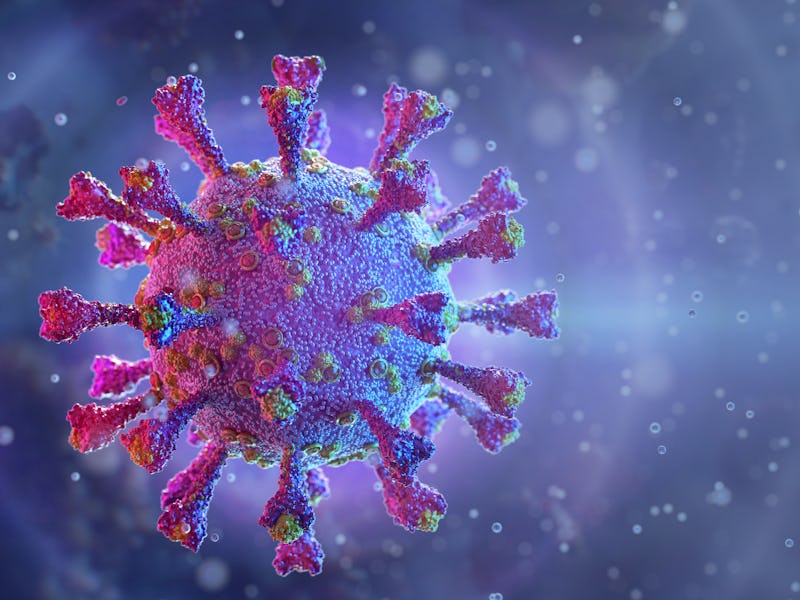An unlikely combination of drugs may work together to fight Covid-19
This study confirms Prozac may help treat Covid-19 in concert with remdesivir — and brings a surprising new candidate to the table.

As new coronavirus variants take root, the race to vaccinate people against Covid-19 continues apace.
Gloriously, early data suggest at least some of the vaccines are effective to some degree against certain variants of the virus and that all the vaccines prevent severe illness. But the variants tell a worrying truth: The more transmissible a virus is to start with, the more likely it is to develop variants. Variants can be much more transmissible than the initial virus.
That more variants of SARS-CoV-2, the virus that causes Covid-19, will emerge is not a possibility; it is inevitable. And that is why scientists also need new treatments to prevent severe disease and suppress this virus. New research suggests we’re on the brink of a breakthrough: Recently, scientists discovered some antidepressants appear to inhibit virus replication and prevent severe Covid-19. And in a new study, scientists confirm a common antidepressant’s efficacy and add another familiar drug to the list of potential treatments — an antifungal medication.
What you need to know — Virus variants show why it is critical to have more than one way to attack a virus — vaccines and treatments that prevent severe disease both have a role to play when it comes to Covid-19. So far, at least one variant appears to evade treatment with monoclonal antibodies (this was one of the therapies given to former President Trump). Taking a multi-pronged approach to beating the virus means developing drugs that both target the virus and target the host cell to make it less hospitable for the virus.
One of the quickest ways to do this is to repurpose current, FDA-approved drugs to treat Covid-19. The reasons why are that we already know who can take them, how safe they are, and at what doses. Research suggests antidepressants may inhibit the replication of SARS-CoV-2 — in other words, the ability of the virus to proliferate in the body and cause disease. Multiple studies find evidence that fluoxetine — aka Prozac — inhibits replication in a cell model.
The new study goes further. It takes this body of evidence and combines it with prior knowledge about an antifungal medication called itraconazole. It also has antiviral properties and has been shown to inhibit the influenza A virus in mice.
What’s new — The researchers behind the new work find evidence to suggest both itraconazole and fluoxetine treat the novel coronavirus when used in combination with remdesivir, which is already used as a Covid-19 treatment. Their findings were published Wednesday in the British Journal of Pharmacology.
In the study, the researchers call attention to two primary findings:
- Itraconazole blocks the production of SARS-CoV-2 infectious particles inside cells in a cell model
- Both a remdesivir-itraconazole combination and a remdesivir-fluoxetine combination inhibited viral reproduction by as much as 90 percent in a cell model
Here’s the background — To understand why this could work to halt the virus, it is important to know that SARS-CoV-2 is an enveloped virus, meaning there’s an outer coating on the surface of each viral particle. That coating is made of lipids, which are fatty organic molecules. Destroying this envelope is key to destroying the virus — this is exactly what soap does if you have virus cells on your hands and then you wash them.
Enveloped viruses gain entry to the host cell through the fusion of that fatty coating with the cell’s membrane. Then the virus’s RNA is transferred into the cell. Once inside, the virus hijacks the body’s own cell replication system to replicate itself, and that’s when things get gnarly.
If a treatment prevents, or at least makes it harder, for the virus to enter a cell, you’re going to have less severe disease outcomes. And if that treatment also inhibits viral replication in the cells it is able to enter, you’ve got yourself a powerful one-two punch combo.
The Inverse Analysis — If you’re on antidepressants or use an antifungal nail cream, this isn’t a license to play with your medication in the hope of somehow preventing or treating Covid-19. The drug combinations have not been tested in animals, never mind in living humans yet.
Before we can know whether either of these drug combinations works in humans, they need to go through rigorous clinical trials and tests. But these initial findings are exciting and, if validated through future research, they could lead to much-needed, effective treatments for Covid-19.
Abstract:
Background and Purpose
The SARS‐CoV‐2 pandemic and the global spread of coronavirus disease 2019 (COVID‐19) urgently call for efficient and safe antiviral treatment strategies. A straightforward approach to speed up drug development at lower costs is drug repurposing. Here, we investigated the therapeutic potential of targeting the interface of SARS CoV‐2 with the host via repurposing of clinically licensed drugs and evaluated their use in combinatory treatments with virus‐ and host‐directed drugs in vitro.
Experimental Approach
We tested the antiviral potential of the antifungal itraconazole and the antidepressant fluoxetine on the production of infectious SARS‐CoV‐2 particles in the polarized Calu‐3 cell culture model and evaluated the added benefit of a combinatory use of these host‐directed drugs with the direct acting antiviral remdesivir, an inhibitor of viral RNA polymerase.
Key Results
Drug treatments were well‐tolerated and potently impaired viral replication. Importantly, both itraconazole–remdesivir and fluoxetine–remdesivir combinations inhibited the production of infectious SARS‐CoV‐2 particles > 90% and displayed synergistic effects, as determined in commonly used reference models for drug interaction.
Conclusion and Implications
Itraconazole–remdesivir and fluoxetine–remdesivir combinations are promising starting points for therapeutic options to control SARS‐CoV‐2 infection and severe progression of COVID‐19.